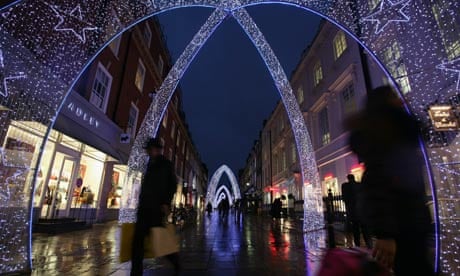High street retailers are braced for an "austerity Christmas" after an influential Bank of England survey painted a gloomy picture of consumer confidence with Britons "going without" or "trading down" and raised fears that more store chains could go bust.
The miserable state-of-the-nation report from the Bank's network of agents around the country came as Tesco revealed a number of initiatives aimed at getting cash-strapped consumers into its stores before Christmas. Britain's biggest supermarket is offering six months' interest-free credit on big ticket purchases such as TVs and iPads for the first time and has also introduced a "trade-in" scheme that lets shoppers recycle their old electrical goods for money off a new purchase or vouchers.
"In these tough times, customers are concerned about the cost of Christmas but are still determined to celebrate with their families," said Richard Brasher, Tesco UK boss. He also announced another wave of price cuts under the auspices of its £500m "big price drop" promotion.
The agents' summary of business conditions for November is based on interviews with 700 businesses. Their report is used to keep the Bank up to date with business conditions at the sharp end. They told Threadneedle Street: "Households were budgeting ever more keenly, trading down to avoid overspending or simply going without."
It added that consumers were putting off replacing durable goods until it was "unavoidable" with this focus on saving money borne out by the success of internet retailers – which let consumers compare prices more easily – and discount chains.
Many retailers make the lion's share of their profits in the weeks up to Christmas but rising living costs mean many households have less to spend than last year. Video games specialist Game and fashion brand French Connection have already warned of weaker than expected sales and JD Sports Fashion, which sells brands such as Adidas and Nike to a young clientele, revealed it was also suffering. It reported a sharp slowdown in sales growth since September and warned that Christmas trading would be tough.
The squeeze on household spending was demonstrated by the latest Asda Income Tracker that showed families were £13 a worse off in October. That was 7% lower than this time last year but better than September thanks to a fierce price war between the major supermarkets that has helped to bring down food prices. Almost half of Asda customers told the retailer they are "worried about the cost of Christmas".
The biggest strain on household finances remains the rising costs of running a family home and car. Gas prices are more than 24% higher than a year ago, while electricity and petrol prices have risen by nearly 15% according to the economic research group CEBR, which compiles the income tracker. "Worsening employment conditions, alongside the persistently elevated rate of inflation, are continuing to erode household real incomes and family spending power," said the CEBR's Charles Davis. "Although inflation is expected to fall back … UK households will remain under pressure for some time."
Retailers are already serving up special discounts such as 50% off toys and clothing to tempt shoppers into their stores but new figures from Experian Footfall, which counts shoppers, suggest they are not working with visitor numbers last week 4.6% lower than this time last year.
The agents' report found businesses expected sales to be "broadly flat" this Christmas but warned of "rising concerns about future failures in the sector if demand fell short of even these modest expectations". The competitive environment, the report noted, meant promotions were "essential" to win trade.
That chimed with Tesco's decision to step up its price-cutting campaign "the big price drop", a rolling price cuts initiative that was launched in September. It has announced plans to cut the price of 1,000 staple products, including meat, fruit and vegetables: "This Friday is the last payday before Christmas for many which means there is a big weekend coming up," explained Brasher.
Tesco said in September that it was investing £500m in cutting prices to arrest a decline in its UK market share. Brasher said that while it would take time for Tesco to feel the benefits of its price cutting, the early signs were good: "If I look at transaction counts and if I look at underlying volume, both of them have improved."
